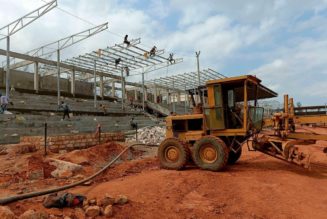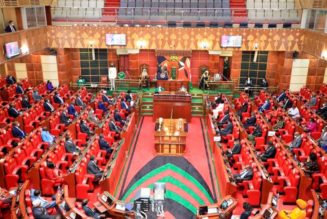Enterprise
Water treatment firm quenches thirst in Kenya’s arid, rural areas
Thursday February 02 2023
Samuel Kinyanjui, a 39-year-old Mechanical Engineer, who founded WaterKiosk Africa – a solar water desalination technology company. FILE PHOTO | POOL
If there is one mistake that shaped the entrepreneurial journey of Samuel Kinyanjui, a 39-year-old mechanical engineer who runs a solar water treatment company, it is engaging in deals that he had no expertise in.
“When I started, I engaged in contracts that I’m not a professional in, and I lost money. I also engaged with unclear business people who were after their selfish interests,” he says.
But years later he mastered the skill of “sticking to his line of expertise, verifying before engaging into contracts and also seeking advice from those with more experience.”
And his line of business is water desalination, a process that takes away mineral components from saline or borehole water.
Mr Kinyanjui started WaterKiosk Africa after resigning from a well-paying job at Geothermal Development Corporation (GDC) where he used to design geothermal systems for use in irrigation, crop-drying, greenhouse heating, and fish ponds.
Before GDC, he worked at Davis & Shirtliff, where his interest in the water sector was piqued. When he went for further studies, he found himself inclined more toward renewable energy and the water sector.
“I picked a lot of expertise from my former employers. Apart from technical experience, I also learned soft skills; budgeting, staff management, and customer retention, among others,” he says.
People tried to talk him out of resigning, but he was adamant. He started scouting for partners to get the business running.
In 2018, at a conference in Nairobi, Mr Kinyanjui met one of his current partners, marking the birth of Water Kiosk Africa.
“We did a desalination unit demo project in July 2018 in Kitengela, Kajiado using our savings to showcase the products and another one in Wasini Island for trials on getting drinking water from the sea,” Mr Kinyajui says.
Technologically, the system worked but financially, it was not making economic sense because they were not getting any returns.
Read: US water firm opens Nairobi office with eyes on East Africa
“At the start, things did not flow smoothly as I had expected. The first four years were full of difficulties in terms of finding the right partners, the right products, and getting rural communities to accept our products. We made many mistakes and learned a lot from the two projects. We improved the desalination systems,” says Mr Kinyanjui.
One of the most difficult aspects of entrepreneurship is raising capital. Mr Kinyanjui and his partners had to dig into their savings to start the company.
“My biggest breakthrough was getting a partner who was willing to risk in a big way. Together, we could make mistakes and combine our strong areas in business development and selling, and were able to sell the idea to clients,” he says,
They import machines from Germany. Mr Kinyanjui says there is plenty of water in Kenya but most of it is not fit for human and animal consumption or agriculture. The biggest cost of making saline water fit for consumption is electricity.
“One of them (solutions) is using solar and wind energy,” he says. Over the years the business has grown. “We treat boreholes that are condemned due to contamination and salinity. Our work stretches to northern Kenya, Somaliland, Zanzibar, and Tanzania,” he says.
They install the solar water desalination system next to the borehole, treat the water and residents then fetch it at a negotiated price.
“We have also introduced vertical farming, fish farming, and saline agriculture so that when we are not making money on the drinking water, we have other sources of revenue from the fish that we rear,” he says.
Through that approach, WaterKiosk Africa has attracted donors willing to support the communities by meeting the capital cost of the desalination system.
The other model they have adopted is the public-private partnership approach.
Read: Plastic pipes firm produces sewer treatment tanks
WaterKiosk has partnered with county governments that provide land and boreholes then WaterKioskAfrica installs solar pumps and desalination systems.
The partnership lasts between five to 10 years after which WaterKiosk hands over the facility to the county government.
“We invest in the desalination process and recoup our investment over time from the people that are buying water from the water companies,” he says.
At the height of the Covid-19 pandemic, hospitals were their biggest clients.
WaterKiosk Africa partnered with GiZ and German Economic Cooperation which supported 28 hospitals across East Africa by buying desalination systems to clean water for drinking.
Through that partnership, WaterKiosk Africa installed 23 systems in Kenyan hospitals, and five in Tanzania, with a daily water production of one million litres of drinking water.
WaterKiosk staff has grown to 303 working across 120 desalination sites in Kenya and Tanzania.
No business thrives without headaches. One of the biggest challenges Mr Kinyajui says he faces is the issue of excise tax on processed water.









